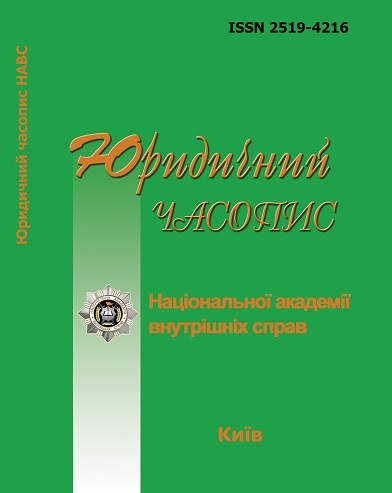Ensuring the Right to Respect for Private and Family Life: Regional and National Levels
Abstract
The right to respect for private and family life is enshrined in the Constitution of Ukraine (Art. 32) and the Convention for the Protection of the Right and Fundamental Freedoms of 1950 (Art. 8) in various ways, in the modern science of constitutional law, the complex, comparative study of its content remains relevant.
Taking into account the European integration processes and the state policy aimed at the harmonization of legal thinking and enforcement, the study of the practice of the European Court of Human Rights regarding the application of Art. 8 of the Convention should be inextricably linked with the study of implementation and practice in protecting the rights enshrined in Art. 32 of the Constitution of Ukraine. The complex nature of this work is that the right to respect for private and family life is in contrast to the right to freedom of thought and expression.
Article 32 of the Constitution of Ukraine prohibits interference with the personal and family life of everyone. Exceptions should be provided for by the Constitution. The realization of the right to respect for personal and family life is carried out by prohibiting the collection, storage, use and dissemination of confidential information about a person without his consent, except in cases provided for by a procedural law, in the interests of national security, economic welfare and human rights.
In addition, this article guarantees every citizen the right to get acquainted in the state authorities, local self-government bodies, their institutions and organizations with information about themselves that are not state or other secrets protected by law; and the right to judicial defense of the right to refute inaccurate information about themselves and their family members and the right to demand the removal of any information, as well as the right to compensation for material and moral damage caused by the collection, storage, use and dissemination of such false information.
The human rights practice of the countries of the Council of Europe, which formed the basis of the 1950 Convention for the Protection of Human Rights and Fundamental Freedoms, caused the content of the right to respect for private and family life (Art. 8) not as a prohibition of interference with private life but as a right to respect for their private and family life, to your home and correspondence.
That is, the Convention protects information on private and family life, housing and correspondence, the Constitution of Ukraine protects as the object confidential information about a person.
It is established that the Convention contains a wider list of lawful service to private life, the Constitution is more rigorous, provides only three grounds. In order to prevent possible controversial situations, and taking into account the jurisdictional capacity of the European Court of Human Rights, we consider it expedient to expand the list in the norm of Art. 32 of the Constitution of Ukraine.
In addition, we have identified a number of inconsistencies in the legislation on information in Ukraine that may violate the right to privacy. Proposed relevant changes to the legislation to eliminate them.
The application of the Convention and practice of the European Court of Human Rights, as a source of law, require the harmonization of national legislation with the Convention. But this process should be judicious and conducted taking into account many practical aspects. The author proposes specific changes to the law to resolve conflict issues.
Downloads
Abstract views: 125 PDF Downloads: 73
Copyright (c) 2018 Law Magazine of the National Academy of Internal Affairs

This work is licensed under a Creative Commons Attribution-NonCommercial-NoDerivatives 4.0 International License.
- Authors reserve the right to authorship of their own work and transfer to the magazine the right of the first publication of this work under the terms of the Creative Commons Attribution License, which allows other persons to freely distribute published work with mandatory reference to authors of the original work and the first publication of an article in this magazine.
- Authors have the right to enter into separate additional agreements on non-exclusive dissemination of the work in the form in which it was published in the journal (for example, to post an article in the institution's repository or to publish as part of a monograph), provided that the link to the first publication of the work in this journal is maintained.
- The journal's policy allows and encourages the posting of articles by authors on the Internet (for example, in electronic storehouses of institutions or on personal websites), both before the submission of this manuscript to the editorial office and during its editorial processing, as this contributes to the creation of a productive scientific discussion and positively affects the efficiency and dynamics of citing the published work.




